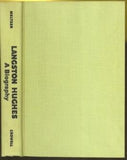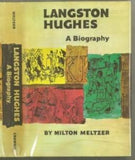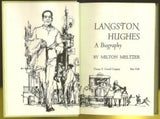Langston Hughes: A Biography
Author: Hughes, James Mercer Langston (1902 –1967) Milton Meltzer (1915- )
Year: 1968
Publisher: Thomas Y Crowell Co
Place: New York
Description:
xiii+281 pages with bibliography and index. Octavo (8 1/4" x 5 3/4") issued in beige with brown lettering to spine. 1st edition.
The son of Carrie Langston Hughes (a teacher) and her husband, James Nathaniel Hughes, Langston Hughes was born James Mercer Langston Hughes in Joplin, Missouri. Hughes is of both African American and Native American descent. After abandoning his family and the later legal dissolution of the marriage, James Hughes left for Cuba, then Mexico, as a consequence of the enduring racism in the United States.[2] After the separation of his parents, young Langston was raised mainly by his grandmother, Mary Langston, as his mother sought employment. Through the black American oral tradition of storytelling, she would instill in the young Langston Hughes a sense of lasting racial pride. He spent most of childhood in Lawrence, Kansas. After the death of his grandmother, he went to live with family friends, James and Mary Reed, for two years. Due to an unstable early life, his childhood was not an entirely happy one, but it was one that heavily influenced the poet he would become. Later, he lived again with his mother in Lincoln, Illinois, who had remarried when he was still an adolescent, and eventually in Cleveland, Ohio, where he attended high school.While in grammar school in Lincoln, Illinois, he was designated class poet. Hughes stated in retrospect that this was because of the stereotype that African Americans have rhythm. "I was a victim of a stereotype. There were only two of us Negro kids in the whole class and our English teacher was always stressing the importance of rhythm in poetry. Well, everyone knows — except us — that all Negroes have rhythm, so they elected me as class poet." During high school in Cleveland, Ohio, he wrote for the school newspaper, edited the yearbook, and began to write his first short stories, poetry, and dramatic plays. His first piece of jazz poetry, When Sue Wears Red, was written while he was still in high school. It was during this time that he discovered his love of books. From this early period in his life, Hughes would cite as influences on his poetry the American poets Paul Laurence Dunbar and Carl Sandburg.Hughes spent a brief period of time with his father in Mexico in 1919. The relationship between Langston and his father was troubled, causing Hughes a degree of dissatisfaction that led him to contemplate suicide at least once. Upon graduating from high school in June 1920, Hughes returned to live with his father, hoping to convince him to provide money to attend Columbia University. Hughes later said that, prior to arriving in Mexico again:“I had been thinking about my father and his strange dislike of his own people. I didn't understand it, because I was a Negro, and I liked Negroes very much.”Initially, his father had hoped for Hughes to attend a university abroad, and to study for a career in engineering. On these grounds, he was willing to provide financial assistance to his son. James Hughes did not support his son's desire to be a writer. Eventually, Langston and his father came to a compromise. Langston would study engineering, so long as he could attend Columbia. His tuition provided, Hughes left his father after more than a year of living with him. While at Columbia in 1921, Hughes managed to maintain a B+ grade average. He left in 1922 because of racial prejudice within the institution, and his interests revolved more around the neighborhood of Harlem than his studies, though he continued writing poetry.Hughes worked various odd jobs, before serving a brief tenure as a crewman aboard the S.S. Malone in 1923, spending six months traveling to West Africa and Europe. In Europe, Hughes left the S.S. Malone for a temporary stay in Paris.Unlike specific writers of the post-World War I era who became identified as the "Lost Generation", such as Ernest Hemingway and F. Scott Fitzgerald, Hughes instead spent time in Paris during the early 1920s, becoming part of the black expatriate community. In November 1924, Hughes returned to the U. S. to live with his mother in Washington, D.C. Hughes again found work doing various odd jobs before gaining white-collar employment in 1925 as a personal assistant to the scholar Carter G. Woodson within the Association for the Study of African American Life and History. Not satisfied with the demands of the work and time constraints this position placed on the hours he spent writing, Hughes quit this job for one as a busboy in a hotel. It was while working as a busboy that Hughes would encounter the poet Vachel Lindsay. Impressed with the poems Hughes showed him, Lindsay publicized his discovery of a new black poet, though by this time, Hughes' earlier work had already been published in magazines and was about to be collected into his first book of poetry.The following year, Hughes enrolled in Lincoln University, an HBCU in Chester County, Pennsylvania, where he became a member of the Omega Psi Phi Fraternity, the first black fraternal organization founded at a historically black college and university. Thurgood Marshall, who later became an Associate Justice of the Supreme Court of the United States, was an alumnus and classmate of Langston Hughes during his undergraduate studies at Lincoln University.Hughes received a B.A. degree from Lincoln University in 1929 and a Litt.D. in 1943 from Lincoln. A second honorary doctorate would be awarded to him in 1963 by Howard University, another HBCU. Except for travels that included parts of the Caribbean, Harlem was Hughes’s primary home for the remainder of his life.Academics and biographers today acknowledge that Hughes was a homosexual and included homosexual codes in many of his poems, similar in manner to Walt Whitman, whose work Hughes cited as another influence on his poetry, and most patently in the short story Blessed Assurance which deals with a father's anger over his son's effeminacy and queerness. It has been noted that to retain the respect and support of black churches and organizations and avoid exacerbating his precarious financial situation, Hughes remained closeted. Arnold Rampersad, the primary biographer of Hughes, determined that Hughes exhibited a preference for other African American men in his work and life. This love of black men is evidenced in a number of reported unpublished poems to a black male lover.On May 22, 1967, Hughes died from complications after abdominal surgery, related to prostate cancer, at the age of 65. His ashes are interred beneath a floor medallion in the middle of the foyer leading to the auditorium named for him within the Arthur Schomburg Center for Research in Black Culture in Harlem.
condition:
Page ends dusty, light rubbing to extremities. Jacket spine age darkened, small stain at heal else a very good copy in like jacket.
Year: 1968
Publisher: Thomas Y Crowell Co
Place: New York
Description:
xiii+281 pages with bibliography and index. Octavo (8 1/4" x 5 3/4") issued in beige with brown lettering to spine. 1st edition.
The son of Carrie Langston Hughes (a teacher) and her husband, James Nathaniel Hughes, Langston Hughes was born James Mercer Langston Hughes in Joplin, Missouri. Hughes is of both African American and Native American descent. After abandoning his family and the later legal dissolution of the marriage, James Hughes left for Cuba, then Mexico, as a consequence of the enduring racism in the United States.[2] After the separation of his parents, young Langston was raised mainly by his grandmother, Mary Langston, as his mother sought employment. Through the black American oral tradition of storytelling, she would instill in the young Langston Hughes a sense of lasting racial pride. He spent most of childhood in Lawrence, Kansas. After the death of his grandmother, he went to live with family friends, James and Mary Reed, for two years. Due to an unstable early life, his childhood was not an entirely happy one, but it was one that heavily influenced the poet he would become. Later, he lived again with his mother in Lincoln, Illinois, who had remarried when he was still an adolescent, and eventually in Cleveland, Ohio, where he attended high school.While in grammar school in Lincoln, Illinois, he was designated class poet. Hughes stated in retrospect that this was because of the stereotype that African Americans have rhythm. "I was a victim of a stereotype. There were only two of us Negro kids in the whole class and our English teacher was always stressing the importance of rhythm in poetry. Well, everyone knows — except us — that all Negroes have rhythm, so they elected me as class poet." During high school in Cleveland, Ohio, he wrote for the school newspaper, edited the yearbook, and began to write his first short stories, poetry, and dramatic plays. His first piece of jazz poetry, When Sue Wears Red, was written while he was still in high school. It was during this time that he discovered his love of books. From this early period in his life, Hughes would cite as influences on his poetry the American poets Paul Laurence Dunbar and Carl Sandburg.Hughes spent a brief period of time with his father in Mexico in 1919. The relationship between Langston and his father was troubled, causing Hughes a degree of dissatisfaction that led him to contemplate suicide at least once. Upon graduating from high school in June 1920, Hughes returned to live with his father, hoping to convince him to provide money to attend Columbia University. Hughes later said that, prior to arriving in Mexico again:“I had been thinking about my father and his strange dislike of his own people. I didn't understand it, because I was a Negro, and I liked Negroes very much.”Initially, his father had hoped for Hughes to attend a university abroad, and to study for a career in engineering. On these grounds, he was willing to provide financial assistance to his son. James Hughes did not support his son's desire to be a writer. Eventually, Langston and his father came to a compromise. Langston would study engineering, so long as he could attend Columbia. His tuition provided, Hughes left his father after more than a year of living with him. While at Columbia in 1921, Hughes managed to maintain a B+ grade average. He left in 1922 because of racial prejudice within the institution, and his interests revolved more around the neighborhood of Harlem than his studies, though he continued writing poetry.Hughes worked various odd jobs, before serving a brief tenure as a crewman aboard the S.S. Malone in 1923, spending six months traveling to West Africa and Europe. In Europe, Hughes left the S.S. Malone for a temporary stay in Paris.Unlike specific writers of the post-World War I era who became identified as the "Lost Generation", such as Ernest Hemingway and F. Scott Fitzgerald, Hughes instead spent time in Paris during the early 1920s, becoming part of the black expatriate community. In November 1924, Hughes returned to the U. S. to live with his mother in Washington, D.C. Hughes again found work doing various odd jobs before gaining white-collar employment in 1925 as a personal assistant to the scholar Carter G. Woodson within the Association for the Study of African American Life and History. Not satisfied with the demands of the work and time constraints this position placed on the hours he spent writing, Hughes quit this job for one as a busboy in a hotel. It was while working as a busboy that Hughes would encounter the poet Vachel Lindsay. Impressed with the poems Hughes showed him, Lindsay publicized his discovery of a new black poet, though by this time, Hughes' earlier work had already been published in magazines and was about to be collected into his first book of poetry.The following year, Hughes enrolled in Lincoln University, an HBCU in Chester County, Pennsylvania, where he became a member of the Omega Psi Phi Fraternity, the first black fraternal organization founded at a historically black college and university. Thurgood Marshall, who later became an Associate Justice of the Supreme Court of the United States, was an alumnus and classmate of Langston Hughes during his undergraduate studies at Lincoln University.Hughes received a B.A. degree from Lincoln University in 1929 and a Litt.D. in 1943 from Lincoln. A second honorary doctorate would be awarded to him in 1963 by Howard University, another HBCU. Except for travels that included parts of the Caribbean, Harlem was Hughes’s primary home for the remainder of his life.Academics and biographers today acknowledge that Hughes was a homosexual and included homosexual codes in many of his poems, similar in manner to Walt Whitman, whose work Hughes cited as another influence on his poetry, and most patently in the short story Blessed Assurance which deals with a father's anger over his son's effeminacy and queerness. It has been noted that to retain the respect and support of black churches and organizations and avoid exacerbating his precarious financial situation, Hughes remained closeted. Arnold Rampersad, the primary biographer of Hughes, determined that Hughes exhibited a preference for other African American men in his work and life. This love of black men is evidenced in a number of reported unpublished poems to a black male lover.On May 22, 1967, Hughes died from complications after abdominal surgery, related to prostate cancer, at the age of 65. His ashes are interred beneath a floor medallion in the middle of the foyer leading to the auditorium named for him within the Arthur Schomburg Center for Research in Black Culture in Harlem.
condition:
Page ends dusty, light rubbing to extremities. Jacket spine age darkened, small stain at heal else a very good copy in like jacket.











